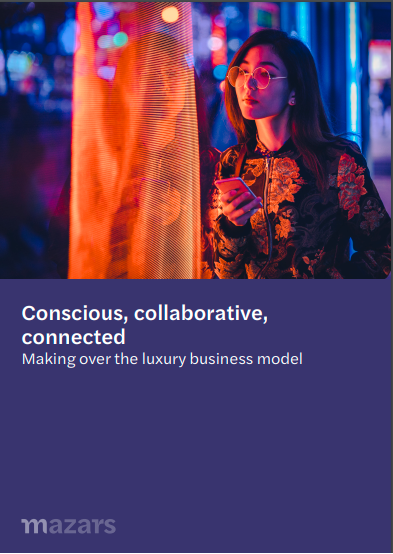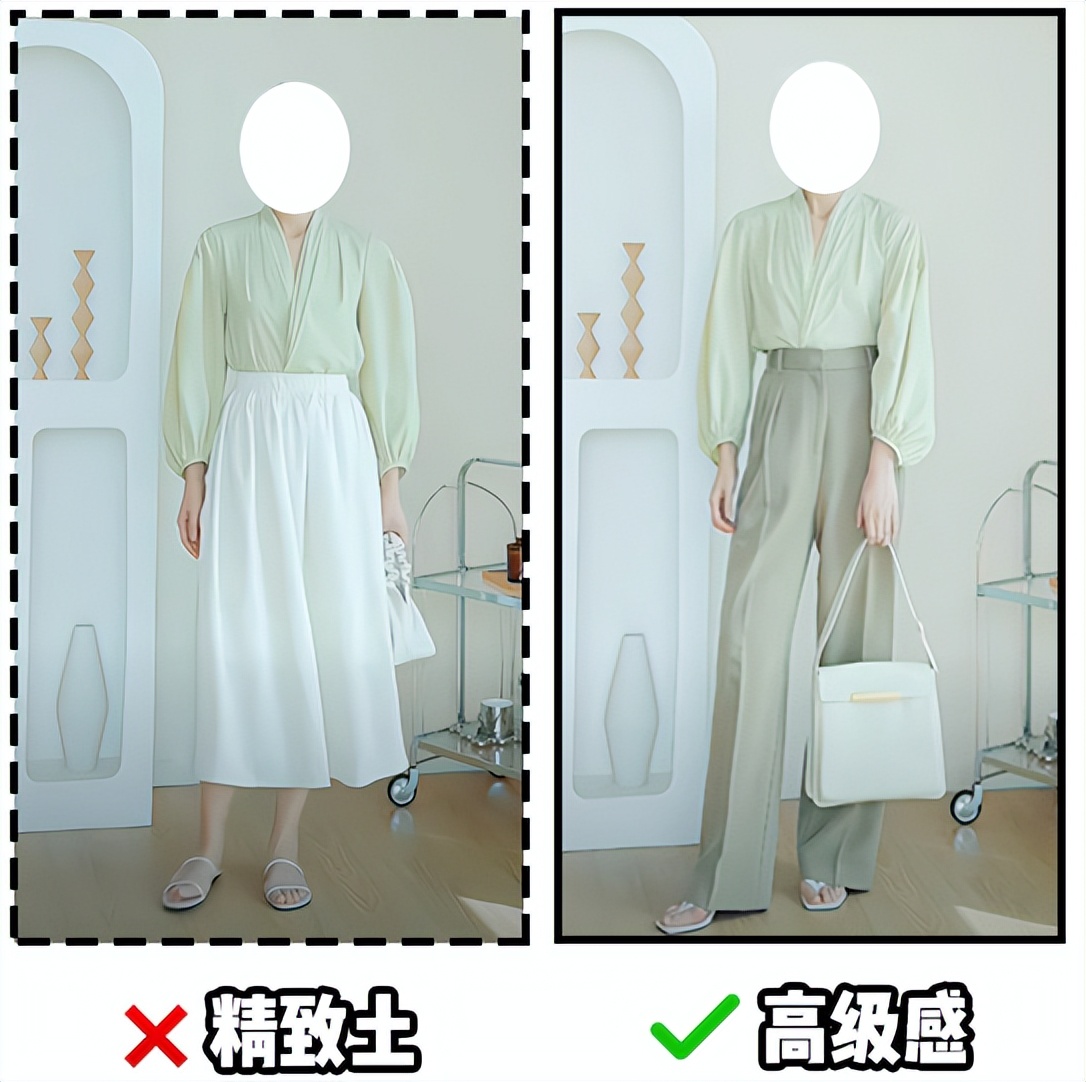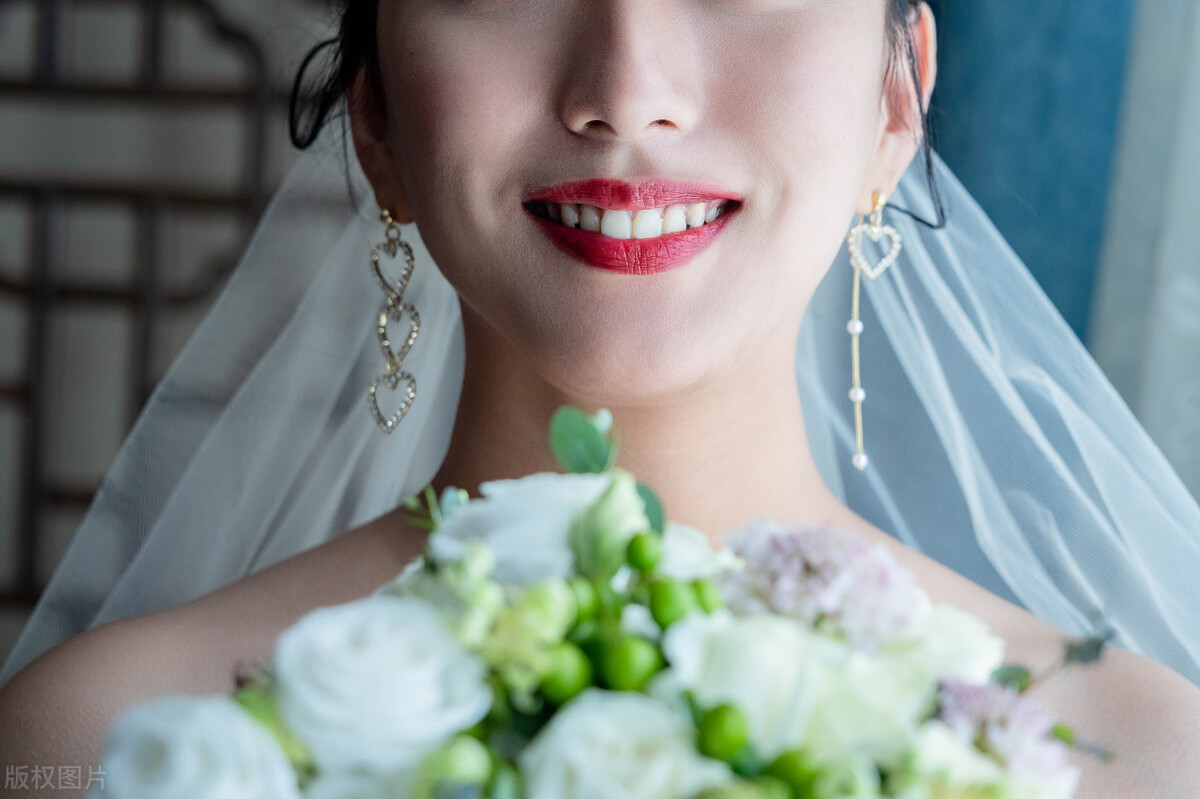——來自Mazars和Arianee的報告
- New customers and new demands leading luxury brands to address sustainability concerns and build cross-sector coalitions
- Luxury customers increasingly expect sophisticated, longer-term relationship with brands, access to seamless post-sale services, unique experiences and transparency – all enabled by digital technologies
- Wealthy Chinese customers, HENRYs (high-earners-not-rich-yet) and Gen Z driving transformation and growth in luxury
- 新消費者和新需求引領奢侈品牌解決可持續(xù)發(fā)展問題,并建立跨行業(yè)聯(lián)盟。
- 奢侈品消費者越來越希望通過數(shù)字技術與品牌建立長期、牢固的關系,獲得無縫的售后服務、獨特的體驗和透明度。
- 富有的中國消費者,亨利一族(HENRYS——高薪準富裕者)和Z世代推動著奢侈品行業(yè)的轉型與發(fā)展。
1December2020, London–Mazars, the international audit, tax and advisory firm, today announces the release of its new report, Conscious, collaborative, connected: making over the luxury business model. The report, published in partnership withthe Arianee project consortium, reveals how the luxury sector is shaping a new business model that allows customers to experience and engage with brands in new ways and to purchase goods knowing they can be easily andexpertly repaired and resold.
2020年12月1日,倫敦——國際審計,稅務和咨詢公司Mazars今天發(fā)布最新報告《洞察、合作與連接:奢侈品行業(yè)商業(yè)模式的變革》。該報告與Arianee項目聯(lián)合會合作發(fā)布,揭示了奢侈品行業(yè)如何建立一個全新的商業(yè)模式,使消費者體驗品牌并與之互動,以及在購買時就了解到產(chǎn)品可以很容易進行專業(yè)維修和轉賣。
Conscious, collaborative, connected includes insights from luxury sector leaders, including Breitling, Comité Colbert, Kering and Vacheron Constantin and draws from an extensive desk review of over 150 articles, reports and other sources.
《洞察、合作與連接:奢侈品行業(yè)商業(yè)模式的變革》涵蓋了諸多奢侈品行業(yè)先驅的見解,包括百年靈 (Breitling)、法國精品業(yè)聯(lián)合會 (Comité Colbert)、開云 (Kering)和江詩丹頓 (Vacheron Constantin),并從超過150篇文章、報告和其他資料中汲取精華。

Changing world of luxury
改變奢侈品的世界
The luxury business model is transforming in response to a changing world: in 2010 luxury customers spent €4.3 billion online; in 2019 that figurerose to €33.3 billion. China is nowluxury’s number one growth market. And the global second-hand goods market has reached€30 billion annually, thanks to12% average annual growthin the last five years.
奢侈品行業(yè)的商業(yè)模式正隨著世界的不斷變化而轉型:2010年,奢侈品顧客在線消費了43億歐元;2019年,這一數(shù)字上升至333億歐元。目前,中國是全球奢侈品消費增速第一的市場。過去五年間,全球二手商品市場已達到每年300億歐元,年均增長率為12%。
According to the report, the new business model taking shape addresses the expectations of these new customer cohorts, prioritises luxury experiences, engages in partnerships and adopts circular practices in pursuit of greater sustainability.
報告顯示,正在形成的新商業(yè)模式滿足了這些新消費群體的期望、優(yōu)先考慮了奢侈品體驗、融入了合作關系,并采取了產(chǎn)品流通實踐以追求更大的可持續(xù)性。
Customer cohorts
消費人群
Luxury customers are increasingly younger andpredominantly come from China. The country is the number one growth market for luxury and home to millions of wealthy customers eager to buy top-end goods. China’s wealthy luxury customers make up one of the three new ‘cohorts’ identified in the report. Other cohorts are: HENRYs (High-Earners-Not-Rich-Yet), found in China and elsewhere, and Millennials and Generation Z – both driving luxury fashion’s market growth potential. Each new cohort brings its own distinctive opportunities and pressures for client-centricity.
奢侈品消費人群呈年輕化,并且主要來自中國。中國是全球最大的奢侈品增長市場,擁有數(shù)百萬渴望購買頂級產(chǎn)品的富裕消費者。報告指出,中國富裕的奢侈品消費者是三個新的“消費人群”之一。除此之外,還包括:來自中國和世界各地的亨利一族(高薪準富裕者),以及千禧一代和Z世代——他們都推動著奢侈品時尚產(chǎn)業(yè)的增長潛力。每個新的消費群體都會帶來以消費者為中心的獨特機遇和挑戰(zhàn)。
Pivoting to experiences and partnerships
玩轉體驗與合作
Throughout a series of interviews featured in the report, luxury sector leaders highlight that ‘clienteling services’ have become the leading edge in luxury’s pivot to customer experience, especially services coming after the initial sale of a luxury product. One example is the take-back and recycling programmes for customers seeking sustainable consumption, including Eileen Fisher’s pioneeringRenewprogramme.
在報告提及的一系列采訪中,奢侈品行業(yè)領導者強調,“客戶服務”已成為奢侈品向消費者體驗轉變的核心,尤其是首次售后服務的提供。比如,針對那些追求可持續(xù)消費的顧客所推出的回收和再利用計劃,其中包括艾琳費雪(Eileen Fisher) 提出的具有開拓性的“再生計劃”。
Partnerships have become vital in ensuring greater transparency, circularity and sustainability.The Fashion Pactis one example of successful collaboration: a global coalition which helps major luxury Houses such as Burberry, Kering and Prada to collaborate with smaller ones by offering brand-to-brand exchanges. In doing so they deliver on the environmental sustainability promise that consumers want.
在保證品牌透明度、流通性和可持續(xù)性的方面,合作關系已變得至關重要。《時尚公約》是一個成功合作的例子:作為一個全球聯(lián)盟,它為大型奢侈品公司,如:博柏利(Burberry)、開云(Kering)、普拉達(Prada)和小型奢侈品公司提供了一個品牌流通的平臺。如此,它們便可實現(xiàn)消費者所追求的環(huán)境可持續(xù)性。
Some of these partnerships have been formed to expressly fight counterfeiting. Fake luxury merchandise is estimated to account for 60 to 70% of the €3.8 trillion of annual counterfeit trade flows.
一些合作關系是專門為了打擊假冒行為而建立的。據(jù)估計,假冒奢侈品在每年3.8萬億歐元的假貨貿(mào)易流量中占60%到70%。
New luxury technology
奢侈品行業(yè)新技術
Technological innovations helping luxury fashion brands to update their model include:
- Digital certification to prove the authenticity of products. Leaders in the field include Arianee, which is currently working with Breitling on a unique digital passport where the watchmaker offers watch owners a complete and continuous service from purchase to repair to resale or transfer – all powered by blockchain.
- Offering liveexperiences such as concerts, special sales, art previews and access to capsule collections – all linked to customers’ social media use and their followers.
- New digital technologies, such as chatbots and radio frequency identification (RFID) tags to speed up and smooth the customer journey.
幫助奢侈品時尚品牌更新模式的技術創(chuàng)新包括:
- 通過數(shù)字認證來證明產(chǎn)品的真實性。這一領域的先驅包括Arianee,該公司目前正與百年靈(Breitling) 合作開發(fā)獨特的數(shù)字護照,制造商為消費者提供從購買到維修再到轉售或轉讓的完整的、持續(xù)的服務——這些服務均由區(qū)塊鏈推動。
- 通過消費者的社交媒體和粉絲群,為消費者提供現(xiàn)場體驗,比如音樂會、特價活動、藝術預展和特選系列的體驗機會。
- 通過新的數(shù)字技術,如聊天機器人和無線射頻識別(RFID)技術,全面提升和優(yōu)化消費者的購買體驗。
Looking ahead: key challenges and opportunities
展望未來:挑戰(zhàn)和機遇
The report covers key challenges and opportunities ahead for the luxury sector, including the impact of Covid-19. This includes how the pandemic has provided the luxury resale market with extra momentum to drive investment in new services. In North America and Europe, many of luxury’s young and affluent customers have suffered a loss of buying power, making the resale market even more attractive to them.
該報告介紹了奢侈品行業(yè)未來主要面臨的挑戰(zhàn)和機遇,包括新冠病毒的影響。其中涵蓋了疫情如何為奢侈品轉售市場提供額外動力,推動新服務的投資。在北美和歐洲,許多年輕富裕的消費者失去了購買力,因此轉售市場對他們的吸引力變得更大。
All brands are expanding their digital presence: Hermès and Tiffany, for instance, are adoptingdigital marketing tools such as livestreaming which they had rejected in the past.
所有奢侈品牌都在擴大自己的數(shù)字化影響力:例如,愛馬仕(Hermès)和蒂凡尼(Tiffany)開始使用它們過去拒絕的直播等數(shù)字化營銷工具。
The report finds the brightest long-term future for luxury players that take seriously customer desire for sustainable consumption. That starts with circularity and finding solutions for recycling luxury products. But it also means going further, to develop new materials and production processes that do not harm the planet, and to bringing supply chain partners along on their sustainability journeys.
對于那些重視消費者對可持續(xù)消費期望的奢侈品公司,這份報告為他們找到了最光明的前景——從產(chǎn)品流通和尋找回收奢侈品的解決方案開始。但對這些企業(yè)來說,任重而道遠,他們需要開發(fā)環(huán)保的新材料和生產(chǎn)流程,并攜手供應鏈伙伴探索可持續(xù)發(fā)展之路。
Isabelle Massa, Partner, Mazars, says, “Luxury brands have long been known for their ability to control how their products are presented and sold. This report uncovers how they are shaping a new business model to match the new market reality. Coalitions that empower brands to be more innovative and circular, and business practices that prioritise a younger, more diverse customer base are becoming the norm.” She adds, “This report reveals the new approaches taken by luxury brands: how they are expanding their digital presence to respond to the pandemic and shifting their models to build sustainable businesses and serve all their customers more effectively than ever.”
Mazars合伙人Isabelle Massa 表示:“奢侈品牌一直以產(chǎn)品展示和銷售的控制能力而著稱。該報告揭示了他們?nèi)绾螢檫m應新市場去塑造全新的商業(yè)模式。合作使品牌更具創(chuàng)新性和流通性,優(yōu)先考慮更年輕和更多樣化的消費群體的商業(yè)實踐正逐漸成為常態(tài)。”她補充道:“這份報告揭示了奢侈品牌所采取的新方法:增強電子商務以應對疫情,并轉變商業(yè)模式來建立可持續(xù)發(fā)展業(yè)務,以期比以往任何時候都更有效地服務所有消費者。”
Pierre-Nicolas Hurstel, Arianee CEO and co-founder, says, “Our findings uncover how the luxury sector is undergoing a makeover, and why. The industry as a whole is evolving, culturally and organisationally, to meet new and old challenges. Technology and partnerships are at the heart of this evolution: as luxury brands find ways to deliver experiences, services, and circular opportunities like resale, so they can keep up with the demands of their increasingly younger, globally-minded customers.”
Arianee首席執(zhí)行官兼聯(lián)合創(chuàng)始人Pierre-Nicolas Hurstel 表示:“我們的研究結果揭示了奢侈品行業(yè)正在經(jīng)歷一場巨變以及變化的原因。全行業(yè)都在文化和組織層面不斷發(fā)展,以應對新舊挑戰(zhàn)。技術和合作關系是這場變革的中心:奢侈品牌正在尋找提供體驗、服務和流通的機會,例如轉售,來滿足越來越年輕的、具有國際視野的消費者的需求。”
Conscious, collaborative, connected: making over the luxury business model has been officially published on Mazars' official website.Click hereto get more in-depth insights right away.
《洞察、合作與連接:奢侈品行業(yè)商業(yè)模式的變革》已正式發(fā)布于Mazars官方網(wǎng)站,點擊此處即可立即獲取更多深度洞察。
A Chinese version will be released officially in January 2021. Please follow Mazars official WeChat account (WeChat ID: Mazars) to get more interpretation of the report.
中文版報告將于2021年1月正式發(fā)布,敬請關注Mazars官方微信服務號(公眾號Mazars),獲取更多報告解讀。
Methodology
研究方法
This study draws from an extensive desk review of over 150 articles, reports and other sources, and in-depth interviews with luxury sector leaders and experts carried out between May and September 2020. The report was created and published in partnership with Arianee.
本研究借鑒了從2020年5月至9月間,對150多篇文章、報告和其他來源的文件進行的廣泛的案頭審查,以及對奢侈品行業(yè)領導者和專家進行的深入訪談。本報告由Mazars與Arianee合作編寫和出版。
About Mazars
Mazars is an internationally integrated partnership, specialising in audit, accountancy, advisory, tax and legal services*. Operating in over 90 countries and territories around the world, we draw on the expertise of 40,400 professionals – 24,400 in Mazars’ integrated partnership and 16,000 via the Mazars North America Alliance – to assist clients of all sizes at every stage in their development.
*where permitted under applicable country laws.
關于Mazars
Mazars是一個國際性、一體化的合伙關系網(wǎng)絡,專注于審計、會計、咨詢、稅務和法律服務*。我們在全球逾90個國家和地區(qū)開展業(yè)務,擁有40,400名專業(yè)人士 ,其中包括Mazars一體化合伙制的24,400名專業(yè)人員以及 Mazars北美聯(lián)盟的16,000名專業(yè)人員 ,可為所有類型消費者的各個發(fā)展階段提供全方位的協(xié)助。
*在適用的國家法律允許的情況下
About Arianee
Founded in 2017, Arianee is an independent consortium whose mission is to build a global standard for the digital certification of valuables. The Arianee protocol makes it possible to associate a unique, unfalsifiable, and augmented digital identity with any item of value. This digital “identity card” opens up a new channel for interactions between brands, owners, and objects that is permanent, secure, and anonymous. Based on blockchain technology, the solution implemented by Arianee is open-source and decentralized. Arianee services offer the first SaaS certificate management platform and mobile wallet applications leveraging the Arianee Protocol.
關于Arianee
Arianee成立于2017年,是一個獨立的聯(lián)合會,其使命是為貴重物品的數(shù)字認證建立一個全球標準。Arianee協(xié)議將一個獨特的、不可偽造的、增強的數(shù)字認證與任意價值的物品結合在一起。這種數(shù)字“身份證”為品牌、消費者和物品之間的互動交流開辟了一條永久、安全和匿名的新渠道。Arianee基于區(qū)塊鏈技術實施開源和去中心化的解決方案。Arianee服務提供了首個利用Arianee協(xié)議的SaaS證書管理平臺和移動錢包應用軟件。













 粵公網(wǎng)安備44030702000122號
粵公網(wǎng)安備44030702000122號